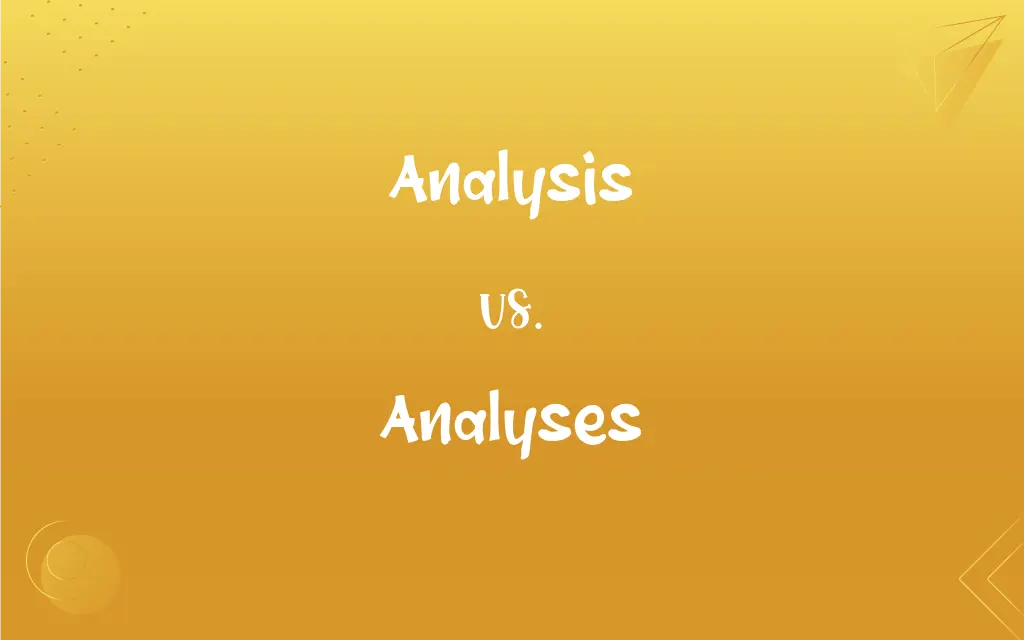Analysis vs. Analyses: What's the Difference?
Edited by Janet White || By Harlon Moss || Updated on October 18, 2023
"Analysis" is a singular noun referring to detailed examination, while "analyses" is its plural, referring to multiple examinations.

Key Differences
"Analysis" is a noun derived from the Greek word "analusis," which means "a breaking up." It signifies a detailed examination or study of something to understand its nature or to determine its essential features. On the other hand, "analyses" represents the plural form of "analysis." It points to multiple instances of such examinations or studies.
In scientific research, an "analysis" often pertains to the process of examining data or results from an experiment. For instance, a researcher might conduct an analysis of data from a single experiment. Conversely, if a researcher looks at the data from several experiments, they are conducting multiple "analyses." This distinction is vital to maintain clarity in research reporting.
Literary "analysis" delves into understanding the deeper meaning or structure of a piece of literature. A student might write an analysis of a single poem. In a literature course, however, students might be tasked with several "analyses" covering various literary works.
In business, an "analysis" could refer to a detailed examination of financial data, market trends, or product performance. Companies frequently undertake these to make informed decisions. If a business examines various sectors or multiple years of data, it's diving into several "analyses" to get a comprehensive view.
In summary, while "analysis" speaks to a singular, focused examination or study, "analyses" extends this to multiple such examinations, offering a broader perspective.
ADVERTISEMENT
Comparison Chart
Number
Singular
Plural
Refers to
One detailed examination or study
Multiple detailed examinations or studies
Usage
Refers to a single study or examination
Refers to multiple studies or examinations
Example Context
Analysis of a poem
Analyses of several poems
Grammar
Used when discussing a single examination
Used when discussing more than one examination
ADVERTISEMENT
Analysis and Analyses Definitions
Analysis
Analysis refers to the process of breaking down a complex topic into simpler parts.
The teacher's analysis of the poem helped students understand its deeper meaning.
Analyses
Analyses are detailed examinations of multiple elements or structures.
The professor provided analyses of several classical literary works.
Analysis
Analysis can be the identification and interpretation of the nature of something.
The medical analysis confirmed the absence of any disease.
Analyses
Analyses denote the studies of multiple instances of mathematical or logical reasoning.
The journal published analyses of several groundbreaking theorems.
Analysis
Analysis is a detailed examination of the elements or structure of something.
The scientist conducted an analysis of the mineral composition.
Analyses
Analyses are the processes of separating various things into their constituent elements.
The team conducted analyses on multiple soil samples from the site.
Analysis
Analysis is the process of separating something into its constituent elements.
The chemical analysis identified several rare elements in the sample.
Analyses
Analyses refer to breaking down multiple complex topics into simpler parts.
The book offers analyses of various philosophical concepts.
Analysis
Analysis denotes the study of mathematical or logical reasoning.
The mathematician presented an analysis of the theorem's validity.
Analyses
Analyses can be the identifications and interpretations of the nature of various things.
The laboratory provided analyses for different blood samples.
Analysis
The separation of an intellectual or material whole into its constituent parts for individual study.
Analyses
Variant of analyze.
Analysis
The study of such constituent parts and their interrelationships in making up a whole.
Analyses
The separation of an intellectual or material whole into its constituent parts for individual study.
FAQs
What is the meaning of analysis?
Analysis refers to a detailed examination or study of something to understand its nature or essential features.
Are analyses and analysis interchangeable?
No, analysis refers to a single examination, while analyses refers to multiple examinations.
In what contexts is analysis commonly used?
Analysis is used in scientific, literary, business, and mathematical contexts, among others.
Can one perform multiple analyses on a single topic?
Yes, a topic can undergo several different analyses, each focusing on a different aspect.
Is a data analysis singular or plural?
"Data analysis" is singular, referring to the examination of one set of data.
How can I differentiate between analysis and analyses in writing?
Remember that analysis is singular and analyses is plural. Context will often indicate the correct form.
Can analysis be used in artistic contexts?
Absolutely, artists and critics often provide an analysis of artworks to interpret meaning or technique.
How does analyses differ from analysis?
Analyses is the plural form of analysis, indicating multiple such examinations.
How are market analyses beneficial?
Market analyses provide insights into consumer behavior, trends, and competition, guiding business strategies.
Can analysis be objective?
While the process of analysis aims to be objective, interpretations can be influenced by individual perspectives.
Is analysis only academic?
No, analysis is used in various fields, both academic and non-academic, like business and art.
How do you pronounce analyses?
Analyses is pronounced as "uh-NAL-uh-seez."
Are there tools for data analyses?
Yes, there are numerous software tools designed for various types of data analyses.
How are literary analyses conducted?
Literary analyses interpret themes, characters, and narrative structures to derive deeper meaning.
How do I use analyses in a sentence?
Example: "The scientist presented her analyses of the five experiments to the committee."
Is analysis subjective?
While analysis seeks objective understanding, the conclusions drawn can be influenced by individual perspectives.
What's the origin of the word analysis?
Analysis originates from the Greek word "analusis," meaning "a breaking up."
What is the goal of financial analyses?
Financial analyses aim to understand economic trends, company health, and investment potentials.
Can the word analysis be a verb?
No, analysis is a noun. The verb form is "analyze."
Can I say "analyseses" to indicate more than one analysis?
No, the correct plural form of analysis is analyses.
About Author
Written by
Harlon MossHarlon is a seasoned quality moderator and accomplished content writer for Difference Wiki. An alumnus of the prestigious University of California, he earned his degree in Computer Science. Leveraging his academic background, Harlon brings a meticulous and informed perspective to his work, ensuring content accuracy and excellence.
Edited by
Janet WhiteJanet White has been an esteemed writer and blogger for Difference Wiki. Holding a Master's degree in Science and Medical Journalism from the prestigious Boston University, she has consistently demonstrated her expertise and passion for her field. When she's not immersed in her work, Janet relishes her time exercising, delving into a good book, and cherishing moments with friends and family.































































